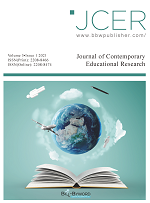Abstract
Currently, a growing number of educators are aware of the need to look for new approaches to replace the “spoon-feeding” method. Therefore, the context-based strategy began to emerge. This study aims to investigate how students derive information through contextual clues by examining the progress of Chinese middle school EFL students in terms of word recognition. The participants of this study included 20 eighth grade students from the same middle school. The participants sat for two different quizzes: a contextual vocabulary quiz (quiz A) and a direct instruction quiz (quiz B). In quiz A, the participants inferred the meaning of the target words from the example sentences, whereas in quiz B, the students utilized the accompanying English explanation to guess other new words. These students were in the experimental and control conditions, respectively. The two quizzes comprised of 15 multiple choice questions (MCQ) which differentiated the participants’ word recognition response to two different learning methods. There were two significant findings from this study. First, the results showed that the context-based strategy leads to a better vocabulary learning performance compared to the direct instruction strategy. Second, although it is not as effective as the context-based strategy, the direct instruction strategy may assist EFL learners in remembering words in short term.
References
Nagy WE, 2005, Why Vocabulary Instruction Needs to Be Long-Term and Comprehensive, in Hiebert EH, Kamil ML, (eds), Teaching and Learning Vocabulary: Bringing Research to Practice, Lawrence Erlbaum Associates Publishers, 27-44.
?lter ?, 2019, The Efficacy of Context Clue Strategy Instruction on Middle Grades Students’ Vocabulary Development. RMLE Online, 42(1): 1-15.
I?lter I?, 2017, Teaching Word Meanings to Students at Different Reading Ability: A Controlled Assessment of the Contextual-Based Vocabulary Instruction on Reading Comprehension. Education and Science, 42(190): 437-463.
Mart CT, 2013, Teaching Grammar in Context: Why and How? Theory and Practice in Language Studies, 3(1): 124-129.
Lai C, Yeung Y, Hu J, 2015, University Student and Teacher Perceptions of Teacher Roles in Promoting Autonomous Language Learning with Technology Outside the Classroom. Computer Assisted Language Learning, 29(4): 703-723. https://doi.org/10.1080/09588221.2015.1016441
Trimmer W, Hawes P, 2015, Utilising Context in Learning, in Blessinger P, Carfora J, Inquiry-Based Learning for Science, Technology, Engineering, and Math (STEM) Programs: A Conceptual and Practical Resource for Educators, Emerald, United Kingdom, 241-256.
Avargil S, Herscovitz O, Dori Y, 2012, Teaching Thinking Skills in Context-Based Learning: Teachers’ Challenges and Assessment Knowledge. Journal of Science Education and Technology, 21(2): 207-225.
Englert CS, 1984, Effective Direct Instruction Practices in Special Education Settings. Remedial & Special Education, 5(2): 38-47.
Luo S, Sun X, 2018, A Case Study on Intermediate CSL Learners’ Word Recognition Processes and Strategies in Contextual Reading Settings. Chinese Journal of Applied Linguistics, 41(3): 288-305.
Holmes G, 1980, A Contextualized Vocabulary Learning Drill for French. Computers and the Humanities, 14(2): 105-111.
Nelson D, 2008, A Context-Based Strategy for Teaching Vocabulary. English Journal, 97(4): 33-37.
Özkan NK, Nurlu M, 2019, Implementation of Context-Based Vocabulary Teaching Method in Turkish Language Instruction for Foreigners. Journal of Language and Linguistic Studies, 15(3): 1139-1154.
Gherwash G, Paiz J, 2019, Building Online Writing Labs: Recommendations for L2 Writing Content Development. TESOL Journal, 11(2). https://doi.org/10.1002/tesj.479
Zhang H, 2015, Morphological Awareness in Vocabulary Acquisition among Chinese-Speaking Children: Testing Partial Mediation via Lexical Inference Ability. Reading Research Quarterly, 50(1): 129-142.
